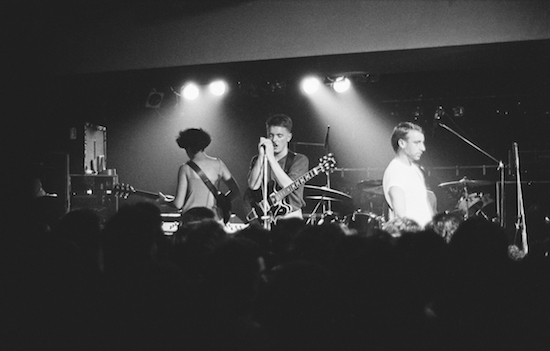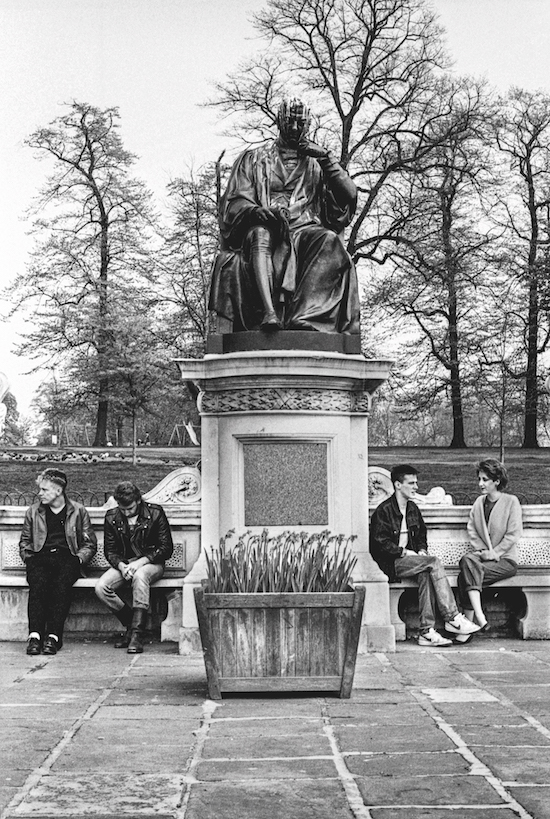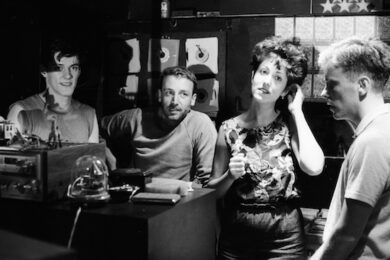New Order in NYC by Kevin Cummins
Forty years ago at exactly this time of year, a 19-year-old from Macclesfield was deciding to join her boyfriend’s band. The group had only been going in their current arrangement since June, only a few weeks after their old singer, a good friend of theirs, had died.
She remembers the time well: “When you’re young, remember how six weeks of school holidays seemed like a very long time, and how a lot can happen in six weeks? You look back and you remember it feeling like years.” Gillian Gilbert played her first gig with New Order at Manchester’s The Squat on 25 October. She sounds younger than 59 down the phone, still living not far away from where it all began. “To think all that happened in only one summer.”
It would take a few years from that point, she reflects, until New Order started feeling properly whole, a process which finally crystallised when the band made their second album, Power, Corruption & Lies. The arrival of a deluxe reissue of the album this week is a perfect way to celebrate Gilbert’s four-decade anniversary of the essential part of the New Order machine. Gilbert was the spark without doubt that made New Order brilliantly new. Her presence disrupted the chemistry, the aesthetic, the approach and the sound of the young men who had kept going, weight on their shoulders.
Accompanied by a new essay by long-time New Order chronicler/ journalist Dave Simpson, plus unreleased demos, radio sessions, live recordings, rare photographs and TV and film footage (including a Channel 4 documentary from 1984, Play At Home), this box set chronicles the fascinating two-year stretch from early 1982 when New Order turned away from Martin Hannett, the architect of Joy Division’s sonic shadowplay, and took it upon themselves to dictate their future. This was the time of some of their ground-breaking singles as well as long-players: their first top 30 hit, ‘Temptation’, the game-changing ‘Blue Monday’, electro floor-filler ‘Confusion’ and lovelorn epic ‘Thieves Like Us’.
This was also a time when Factory Records’ fantastical projects were going into overdrive (kick-started by the Haçienda opening to general befuddlement in May 1982), and when technology was rapidly changing pop culture against a background of political fear.
Gilbert is warm and sweetly humble on the phone as she travels back in time. She’s calling from her home studio, which isn’t far from where she and her old boyfriend grew up (she married him in 1994, and their two daughters are adults now). She laughs often, remembering one of the best times of her musical life.
“Won’t you please let me go? These words lie inside” – ‘Age Of Consent’
"Power, Corruption & Lies was a very happy time. I remember us coming out of Movement, and how that wasn’t so happy with the stuff around Martin. We were getting bolder, saying ‘We don’t really like that’, only for him to reply, ‘Well, I’m the producer, you’re in the band.’ So we decided to work on our own productions ourselves, getting to know what we wanted to sound like, which is half the joy of being in your own group.
"Nobody in the band wanted another Joy Division. We were starting to getting a new audience as we were getting the new sound together too, which was exciting. We were going somewhere else with this, somewhere we’d just discovered, further and further away from the past. But in the middle of it, Bernard was very unsure about being the singer. When he started doing all the lyrics himself to the songs [which he did on P,C&L, as on Movement lyrics were done more by committee], he got into it more, but he was still dealing with the fact that he didn’t really want to sing. Ian had wanted to be the singer, and he was a singer. It’s odd to suddenly be put in that position if you like hiding behind an instrument, to be thrown into the spotlight. Bernard had a lot to contend with."
“Life goes on and on in this real-life fantasy” – ‘We All Stand’
"We were just in our own little world back then, being creative in different ways. It was a scary time, though. The threat of nuclear attack – I remember being very scared of that, how it felt it could actually happen. But still, in our bubble, things felt good. We started doing our own little videos, because of MTV coming through, and videotapes being more readily available. The boys liked video nasties, and I remember us staying up late to create the video for the opening of the Haçienda after Tony asked us to do something. [This instrumental track for it, ‘Video 5 8 6’, is missed off the deluxe edition, despite it featuring elements that are also on ‘Everything’s Gone Green’, ‘Ultraviolence’ and ‘Blue Monday’.] It had crocodiles and things on it, that video. It was quite funny. Not that anybody could really see it on the night, but that’s Factory for you!
"The title of the album was very apt. We were going through a lot with Factory and with the Haçienda at the time. It summed things up completely. [I mention the Channel 4 documentary about New Order, Play At Home, which is included in the deluxe edition, in which they speak to other Factory artists; it was broadcast in 1984.] I felt quite sorry for the other Factory bands back then. They didn’t have the same support as us, and you know, Tony had an answer for everything. But they’re doing really well now, A Certain Ratio especially, and a lot of Factory bands have been rediscovered. When I think of that film, I just remember Tony in this bar with bottles of fizz pouring them into glasses, the bands asking them about their money. And that was him."

New Order live at the Haçienda, 1983 by Paul Slattery
“Heard you calling?/Yes, I heard you calling” – ‘586’
[I mention a sequence which runs through the film in which Gillian comes to Tony Wilson’s house and interviews him in the bath; he is naked, with a rotary telephone next to him, while she is fully-dressed – I suggest this wouldn’t get signed off in 2020.]
"That whole thing was weird. You wouldn’t get a band interviewing your manager or anything like that these days, would you? I wasn’t looking, of course. And they thought that was hilarious, everyone else. To be honest, I’d been on the road with them a lot, so nothing shocked me. ‘You’re just acting, aren’t you?’ I just knew I wanted to be in a really nice dress, so I got a nice second-hand one from Macclesfield. I thought he was hilarious that day. Would I do it now? [Laughs] No way. When you’re young just think, I’ll do that. You don’t think much about it.
[I also mention something Tony says on the documentary about doing things first, then thinking about why you’d done them later: how this is a very punk statement, in a way, but also feels part of those Thatcherite times, when the circumstances of other people aren’t necessarily considered.]
"Saying that’s alright up to a point, but Tony had a job, didn’t he? He worked at Granada. All the bands that were struggling, that was their only job in a way. But maybe Tony had a point about thinking. You think yourself out of things a lot these days. You don’t take a chance, and that’s perhaps what he meant. I remember Rob saying to us back then it doesn’t matter how long the second album takes, as long as it’s a good album. You’ll reap the benefits afterwards. I remember worrying about spending a lot of money on it, and him, saying if it’s a good album, it’ll be worth it. And that’s true, isn’t it?"
“Everybody makes mistakes. Even me. Just be free.” – ‘Ultraviolence’
"We developed a lot of the songs for Power, Corruption & Lies live, just trying things out. You never knew if we were going to have a good show or a bad one back then. That was partly because our equipment was never meant to be taken on the road, and partly because if Bernard had had too many Pernods, you never knew what was going to happen. It was exciting! I liked looking at the audience looking at each other going, ‘What are they going to do next?’ But we were young, and we were just taking risks. I think a lot of people did that in those days, more than now.
"We starting doing demos for the album at our rehearsal room in Cheetham Hill, then went down to London, to the studios in Britannia Row, where the boys had made Closer. We also had Michael Johnson with us in London as our engineer, who had worked on Closer too, so there was a familiarity, but also this feeling of a new start. We were like a proper gang together. It was wild because we all lived in one flat. Four bedrooms with a shared living room and kitchen. How was that? It was alright sometimes. [Laughs] I don’t think I’d like to do it now!
"It was good going away from home though, as you felt you could concentrate more, and it felt like we were doing an album. We did Movement in dribs and drabs, and the feeling of weirdness in it was partly from that, and of course because of Martin producing it. This felt very different. We drove past Britannia Row last year, a proper trip down memory lane. It’s totally changed round there – everything was so different. Back then it was quite grimy with nobody around, nothing there. It made me feel pretty old!"

New Order in Kensington by Paul Rider
“When you’ve laid your hands upon me/And told me who you are” – ‘Blue Monday’
"We did everything on the cheap in terms of the technology we had. We wanted a Fairlight but it was far too expensive, so we got the cheaper version, the Emulator. I liked plugging everything in when we took the equipment to gigs. I used to do a separate sound-check because I didn’t trust the roadies. They’d be: ‘Can you do this?’ [nonchalantly] ‘Yeah.’ ‘Can you do that?’ ‘Yeah!’ ‘And play over the top?’ [Even more nonchalantly] ‘Yeah!’ [laughs] I also enjoyed writing all the sequences down to make everything play properly, which was something not many people could do. It was a challenge! But I loved it."
“No hearing or breathing, no movement, no colours, just silence” – ‘Your Silent Face’
"Because there was a 16-track at the studio, we couldn’t have many tracks going on, and that simplicity really suited the songs. We also listened to a lot of Kraftwerk in Britannia Row, because we liked their simplicity: there aren’t many tracks on their albums, and their music’s stripped down. I hadn’t heard Kraftwerk, really, until New Order. It’s like me and the Velvet Underground. I didn’t hear them until then either. [laughs] Thing is, the band were all a bit older than me, so I was catching up. I liked Lloyd Cole and Depeche Mode back then too. We’d listen to bands who did the kind of songs we wanted to do in the studio, though.
"Bernard didn’t do much singing in the studio. He’d come up with lyrics and melodies live when we’d take these instrumental tracks on the road. He found that quite freeing, I suppose, rather than being stuck in the studio coming up with words. I remember him doing that with ‘Thieves Like Us’ – we’d come up with simple string riff and a change as a band, then he came up with a vocal line live. In those days, we also didn’t know about keys or anything [i.e. how to transpose the music to suit Bernard’s voice], so ‘Thieves Like Us’ is completely out of his range, but because we didn’t know how to change it, he just went for it. He wasn’t pre-programmed to think, ‘Oh, I can’t sing this way.’ I think that’s why it sounds so uplifting.
"’The Village’ too: Bernard just started singing those lyrics at a gig – “Our love is like flowers, the rain, the sea and the hours” – that was off the top of his head. We don’t do a lot of that improvising now, and I miss it. But I suppose it’s inevitable. You become more conscious of what you’re doing."
“When a new life turns towards you/ And the night becomes the day/ We shall remain forever” – ‘The Village’
"Making ‘Temptation’ [in early 1982] was when we really realised what we were doing. We thought we were just going, ‘Ooh, what could we do if we plug this in there?’ and messing around with gates and things, but then we’d make a song of it. When we got a new set of equipment we always wrote something. We were pushing the equipment. There was something very new and creative in the joy of doing all that.
"There was the same feeling when we made ‘Confusion’ [in 1983]. We’d just decided to try and do something with Arthur Baker, because we loved going to New York, and loved that idea of making a track that could be played in a club rather than just on a stage. When we got there, there was twelve feet of snow. No one was moving. You couldn’t get a taxi. He thought we’d write something. We thought he’d write something. We just felt like little kids with this big imposing proper record producer! [laughs] But that was great. It was just another way of experimenting, working with somebody different, letting ourselves try things. That feeling made what we did back then what it was."
“Our lives still change from the way that we were” – ‘Confusion’
"What are my favourite tracks off the album? ‘We All Stand’ is probably my favourite because it’s quite spooky and cinematic. We wanted to do things that sounded soundtrack-y. And ‘Leave Me Alone’ – I love that – we keep trying to play that live. ‘Ultraviolence’ we still play now, which has some of my riffs on it, and ‘Your Silent Face’. The strings and the vocals just come together on that, don’t they? I love how it sounds so much like an orchestra, and it still gives me excitement to play it. I never get fed up of it. It’s that and ‘Blue Monday’ for me. Until either of them go wrong. Then it’s ‘Oh my God, once you’re in, you can’t get out!’"
“All those years ago. All those years ago. All those years ago” – ‘Ultraviolence’
"What are the things I hold onto after forty years? Taking some time off from them all! [Gilbert left the band in 2001 to care for her and Morris’ daughter Tilly, who had the spinal condition transverse myelitis. Morris had also offered to, but the couple had decided he would be harder to replace in the band. Gilbert also had breast cancer in 2007, which she recovered from, and rejoined the band in 2011.] Leaving made me realise what we’d done, being away, as well. It was great coming back.
"The other thing that sticks in my mind is going to the Pretty In Pink premiere in America, after doing ‘Shellshock’ with John Robie. I had another nice dress for that. [laughs] The track had a couple of my riffs in it too, and I was really proud of that. That’s what you want to do all along – to move from playing to actually writing something, to go from being one part of the band to feeling that something you’ve done is out there in the world."
Power, Corruption & Lies (Definitive Edition) is out on 2 October



